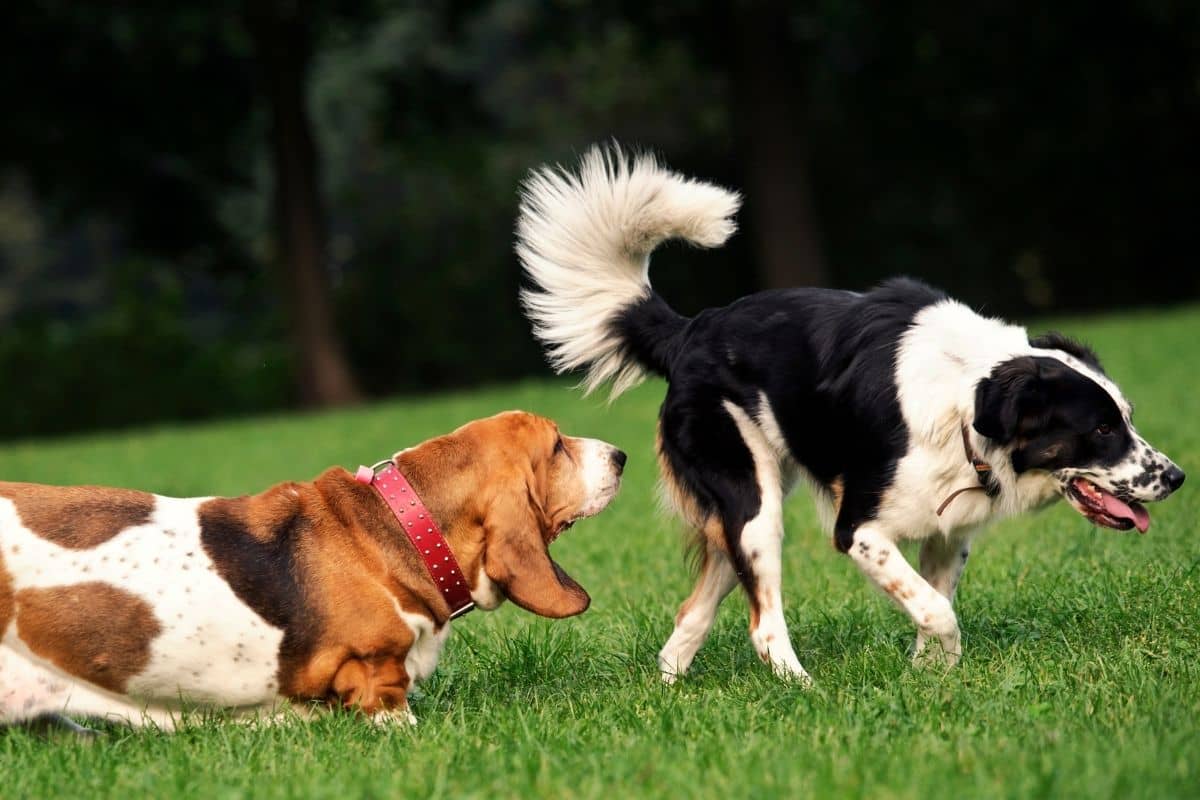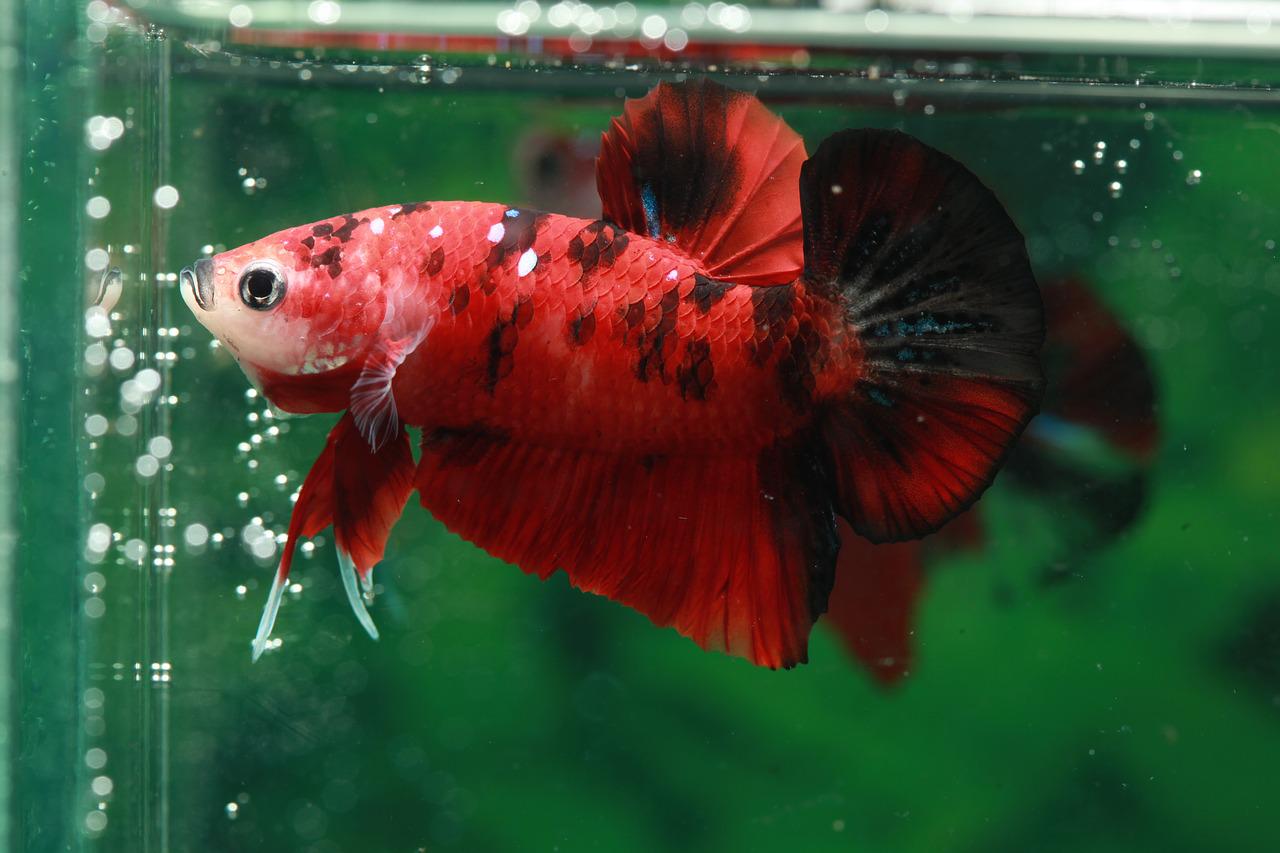If you’ve ever owned dogs, you’ve likely noticed this strange habit – they immediately stick their noses right into each other’s rear ends upon meeting. Why do dogs sniff butts, anyway? Is there a purpose behind this peculiar behavior?
As it turns out, there are several reasons dogs sniff each other’s butts. It’s an instinctive way they gather information and bond. While the habit may seem impolite to humans, it’s perfectly natural for canines.
In this article, we’ll explore the explanations behind butt sniffing in dogs. We’ll also provide some tips for curbing the behavior when needed. Let’s get to the bottom of this behavior!
It’s a Form of Greeting
For dogs, sticking their nose into the rear of another dog is a standard greeting ritual. Humans shake hands, wave, or say “hello.” Dogs sniff butts. It’s their equivalent of “Nice to meet you!”
You’ll notice dogs usually partake in prolonged rear-end sniffing upon first meeting, whether on walks, at the dog park, or in the home with a new guest pooch. It’s just their way of becoming acquainted.
Think of it like getting a person’s name, background, and identity all in one big inhale. They’re gathering essential information before interacting further.
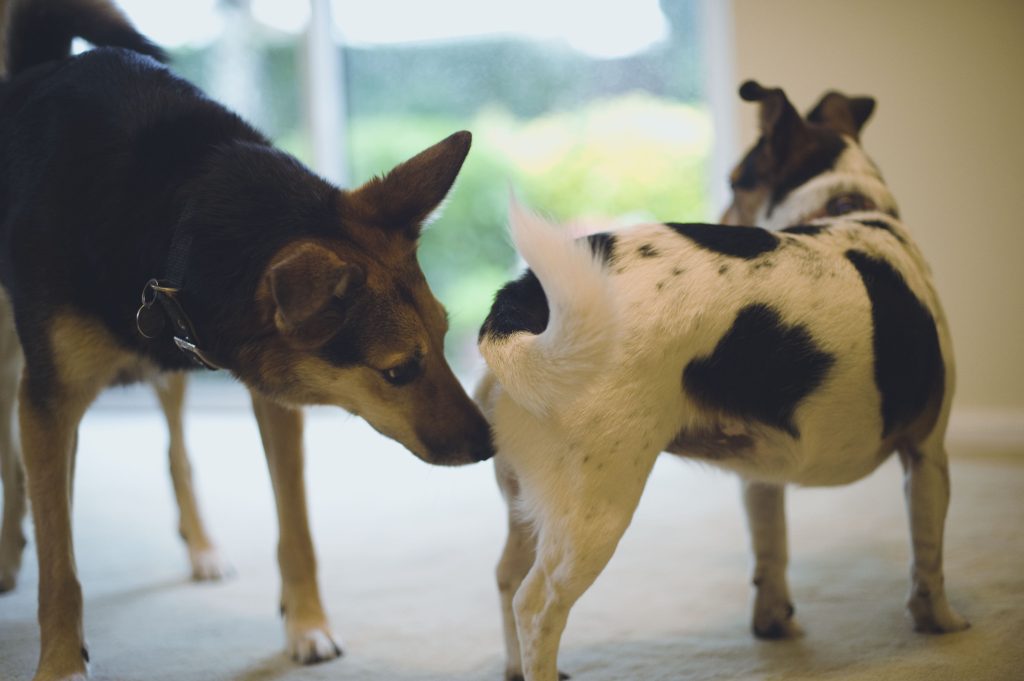
It Provides Identity Information
So what exact information can dogs gather from butt sniffing? Quite a lot!
A dog’s rear contains multiple glands that secrete pheromones and oils carrying distinct scents and signals about that dog. By sniffing these secretions, dogs can determine:
- Gender – Male and female dogs produce different pheromone chemicals.
- Reproductive status – Neutered and intact dogs also have distinct scents.
- Age – Puppy and adult pheromones differ too.
- Health status – Infection, sickness, and anal gland issues can produce telling odors.
- Mood – Rear scent changes with emotional states like fear, aggression, friendliness, etc.
- If they’ve met before – Each dog has unique chemicals that identify them.
Essentially, butt sniffing allows dogs to gain a wealth of details and background. It provides context before engaging in close interactions with a new dog.
It Strengthens Social Bonds
Butt sniffing doesn’t just convey information – it also helps foster social connections between dogs.
The pheromones and signature scents dogs smell during rear sniffing get processed in a part of the canine brain closely associated with emotion and relationships.
So butt sniffing not only gives dogs information, it also triggers bonding hormones like oxytocin. This helps put both dogs at ease and stimulates positive associations.
Over time, repeated butt sniffing between the same dogs strengthens their social relationship and compatibility as companions or pack members.
Think of it like social media connections between people. Interacting repeatedly in a friendly way gradually deepens relationships. For dogs, that friendly interaction is butt sniffing.
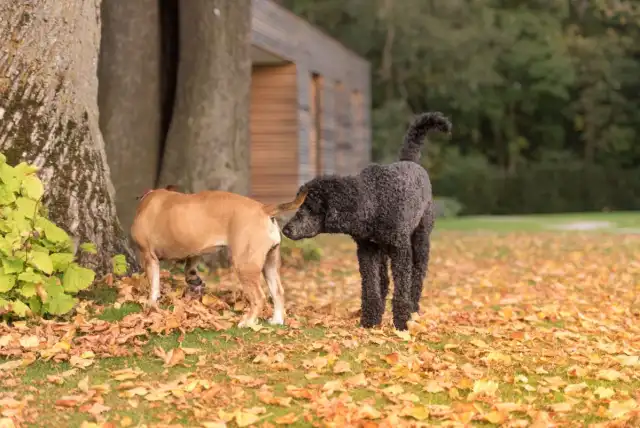
It Reduces Conflict
Butt sniffing also plays an important conflict-reducing function for dogs.
By promptly sniffing rears upon meeting, dogs establish a baseline social hierarchy and set expectations for the interaction. It reduces uncertainty that could otherwise trigger aggressive behaviors.
Essentially, butt sniffing ritualizes the greeting process, signaling both dogs have peaceful intentions. It reassures everyone where they stand in the social order.
Dogs who move straight into playing without an initial butt sniffing exchange may escalate too quickly or overstep boundaries, often resulting in a fight. That first rear inhale is critical.
When to Discourage Butt Sniffing
While butt sniffing is a natural dog behavior, there are certain situations where you should gently discourage it, including:
- With unknown dogs – Avoid letting your dog sniff the rear of unfamiliar dogs. Not all will react politely, which could spark a confrontation.
- With people – It’s fine for dogs to sniff one another, but teach them not to butt sniff human guests for sanitary reasons.
- On walks – Limit prolonged butt sniffing on walks to keep things moving. A quick greeting is fine, but then redirect their attention.
- Around food – Don’t allow butt sniffing when dogs are eating. That can quickly lead to resource guarding fights.
Use positive reinforcement training and commands like “Leave it” to curb excessive or inappropriate sniffing as needed. But keep in mind scent communication is part of normal dog behavior, so allow some friendly rear investigating.
Why Do Some Dogs Not Like Butt Sniffing?
While most dogs instinctively butt sniff upon meeting, some may dislike having their rear smelled or sniffed by other dogs. Reasons include:
- Fear or lack of socialization – Anxious or under-socialized dogs often don’t understand butt sniffing signals.
- Domineering personality – Confident dogs may see butt sniffing as a challenge to their status.
- Pain or medical issue – Dogs with rectal discomfort, trauma, or infections don’t want their rear touched.
- Scent disguise – Some dogs mask their signature scent to avoid identification, confusing butt sniffers.
If your dog reacts aggressively or fearfully when another dog tries to sniff their rear, consult a trainer or behaviorist for professional advice. Don’t punish or scold the behavior, as that will only increase anxiety.
Why Do Some Dogs Sniff Butts Excessively?
Most dogs partake in a normal exchange of rear sniffing upon meeting then move on. But some dogs become obsessive about sniffing other dogs’ behinds. Reasons for excessive butt sniffing include:
- Lack of social skills – Improperly socialized pups don’t pick up on body language cues to stop.
- Adolescent phase – Teenage dogs are still learning social interaction nuances.
- Anxiety – Stressed dogs need more scent information for reassurance.
- Understimulation – Bored dogs find butt sniffing highly interesting.
If your dog fixates on other dogs’ rears past a quick greeting, work on redirection training and providing more enrichment. Consult an expert if the habit seems compulsive.
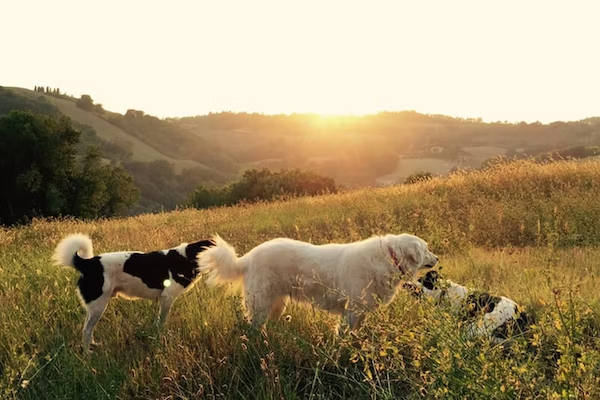
Frequently Asked Questions
Still have some questions about why dogs sniff butts? Here are a few common queries:
Is butt sniffing a sign of dominance?
Contrary to popular belief, butt sniffing is not a dominance behavior itself. All dogs sniff butts upon meeting regardless of rank. However, a dominant dog may discourage another dog from sniffing their rear.
Do female dogs sniff butts when in heat?
Yes, though heat cycles affect a female dog’s pheromone production. This draws very enthusiastic butt sniffing from intact males looking to mate. Expect male fixation during this time.
Why does my dog sometimes block other dogs from sniffing their butt?
Some dogs dislike having their butt smelled, perhaps due to pain, insecurity, or desire to conceal their identity. Work slowly to socialize them through positive experiences.
Can butt sniffing spread illness between dogs?
There is some disease transmission risk from butt sniffing, but it’s lower than many owners think. Far more contagions spread through saliva than rectal glands.
How can I teach my dog not to butt sniff visitors?
Use a command like “Leave it” when they try to sniff rear ends. Distract and reward them for disengaging. Manage greetings until you proof the behavior over time.
While butt sniffing behavior may seem silly or gross to humans, it’s a completely natural dog ritual for exchanging information and forming bonds. Hopefully this article gave you insight into why dogs partake in rump research! Let us know if you have any other dog behavior questions.
